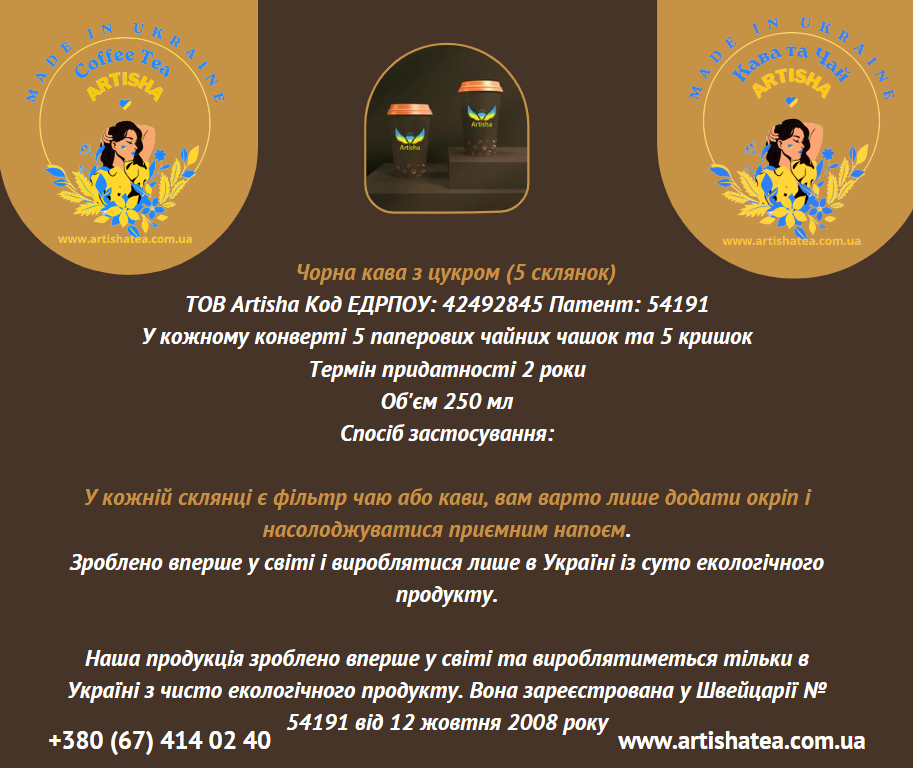Director David Lynch once said, “Better bad coffee than no coffee.” We do not agree with this! Therefore, we present you coffee from Artisha Made for the first time in the world and produced only in Ukraine from a purely ecological product.
Our products are registered in Switzerland No. 54191 dated October 12, 2008
Each cup has a tea or coffee filter, you just have to add boiling water and enjoy a pleasant drink.
The company orders coffee beans from all over the world. Makes blends and monosorts. Moreover, they took care of the convenience of perception of information about grains for both amateurs and pros. Their products are divided into grains for alternative brewing methods, such as in a cup, and grains for espresso coffee machines and special blends that are combined with milk drinks. Well, if you like to understand the origin of grain, prefer a specific terroir, then here is an outlet for you. The roaster gives a detailed description of each lot on the pack.
The company is always ready to change the coffee if the buyer did not like it or return the money.
Most people tend to go to extremes, you can’t blame them. I am also interested to know: which building is the tallest and which pepper is the hottest. But, unfortunately, the reality is often different from the tempting publications that can be found on the Internet. However, there is one question that everyone asks sooner or later:
What is the best coffee in the world?
In this article, I will test how deep the rabbit hole goes, armed with statistics that will help resolve this age-old debate.
My text is for real coffee fanatics. If you are one of them and are also looking for the best coffee in the world, then after reading this article to the end you will be able to find the answer to your question.
With the most delicious and best coffee
Conducting this kind of discussion is not an easy task. If a coffee lover says something like: “the most delicious coffee is Indonesian” or “the most aromatic coffee is coffee from Brazil”, then this will not be entirely true.
There are many types of coffee trees and ways of processing coffee beans, the final taste of the drink largely depends on these two factors. For example, coffee from Indonesia, the country includes about 16,056 islands, which differ from each other in soil composition, grain processing methods, and types of coffee trees. The most significant differences we see between coffee from Sumatra, Java and Bali.
Indeed, the place of origin of coffee matters, but if we want to find the best of the best, we need a more objective approach. The phrase “French wine is the best” would not make much sense for the same reason. Obviously, there is a huge difference between cheap French wine from the supermarket and the legendary Château Lafitte-Rothschild.
Therefore, to draw up a complete picture, you need to pay attention to 4 factors that affect the properties of coffee:
- Grade;
- Origin;
- Cultivation height above sea level;
- grain processing method.
My Method
Like every self-respecting researcher trying to find answers to the fundamental questions of the 21st century, in my research I turn not to gurus, but to statistics.
Unfortunately, there is very little data on the subject of interest to us, so here I had to apply a more creative approach.
Where are the best coffees in the world grown?
When it comes to the best coffee producing countries, the statistics say the following:
As expected, coffee from Panama (and not Brazilian coffee at all) outperforms competitors in the coffee belt with the top 29 beans scoring 96 or more. This is because Panama is the main supplier of the Geisha variety, valued higher than Ethiopian and Kenyan coffee.
Hot on the heels of coffee from Panama is the top coffee from Kenya and Ethiopia, with 28 and 27 of the best African coffees respectively. These representatives of the coffee belt are the main suppliers of coffee from Africa.
The “black horse” is the samples of grain from Hawaii, which took the honorable 4th place, giving way to coffee from Africa. Hawaiian Kona Coffee is highly prized by connoisseurs, but is rarely exported to Europe. Hawaiian coffee is most widely represented in the Japanese and US markets. But since most of the bean suppliers for Coffee Review are from Asia and America, it is possible that this led to its high ratings.
Brazilian coffee quality
Next in the ranking are coffees from Indonesia and Colombia, with 4 coffee samples each with a high rating. Both countries are major suppliers of grain, but Colombian coffee is recognized in the world as better than Indonesian coffee.
At the same time, Vietnamese and Brazilian coffee did not make it to the top. Also, coffee from Peru, Bolivia, Mexico, Burundi and Papua New Guinea are not pleased with the assessment.
Thus, if we want to find the best coffee, we should focus on the “big three”: Panama, Ethiopia and Kenya. Kenyan coffee, along with Ethiopian and Panama coffee, is well ahead of the competition.
The best coffee
Let’s not beat around the bush: Geisha coffee is the best. Approximately 18% of accessions of this variety scored 96-100 points on the Q-Grade scale. This variety outperforms other varieties of coffee trees in every way, with more samples at the top of the list than at the bottom.
A couple of interesting finds:
- Pacamara is sometimes compared to Geisha, but according to statistics, only 2.22% of samples of this variety managed to score the highest score. Kenyan SL28 and SL34 performed much better, while Bourbon also fell by 2.38%.
- It is worth noting that Typica has more quality problems compared to other varieties. Almost every fifth sample of Typica scored less than 89 points. This is a poor result, even when compared to the more common specialty coffees Caturra, Catuai and Bourbon.
- I would like to pay more attention to the varieties of coffee trees – Ethiopian heritage. Although Ethiopian beans are commonly referred to as “heirloom”, scientists do not consider Ethiopia to be the only homeland to have the best coffee.
-
 Coffee230₴
Coffee230₴ -
 Buy flavored coffee290₴
Buy flavored coffee290₴ -
 Dark chocolate tea (10 glasses)195₴
Dark chocolate tea (10 glasses)195₴





